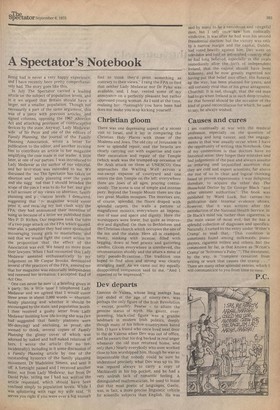Dev departs
Eamonn de Valera, whose long innings has 'just ended at the age of ninety-two, was perhaps the only figure of the Irish Revolution – except, possibly, Pearse – to attain the genuine status of myth. His gaunt, overpowering, black-clad figure was a granite landmark in modern Irish politics, deeply though many of his fellow-countrymen hated him. (I have a friend who once lived next door to the de Valeras when Dev was out of offiCe, and he swears that his dog barked in real anger whenever the old man returned home, and only then.) Nearly everybody who ever worked close to him worshipped him, though he was so impenetrable that nobody could be sure he understood precisely what Dev was up to. He was reputed always to carry a copy of Machiavelli in his hip pocket, and he had a very unIrish lack of romantic feeling. A distinguished mathematician, he used to insist that that most poetic of languages, Gaelic, was, in fact, a more precise linguistic vehicle for scientific subjects than English. He was said by many to be a venomous and vengeful man, but I only once saw him comically vindictive. It was after he had won his second Presidential election: but the victory was only by a narrow margin and the capital, Dublin, had voted heavily against him. Dev went on television and told an astonished country that he had long believed, especially in the years immediately after the birth of independent Ireland, that the capital should have been Kilkenny, and he now greatly regretted not having put that belief into effect. His funeral, by the way, has been planned for years, and will certainly rival that of his great antagonist, Churchill. It is sad, though, that the old man had to go when Ireland is in such deep trouble, for that funeral should be the occasion of the kind of grand reconciliation for which, he used to say, he always wished.


































 Previous page
Previous page